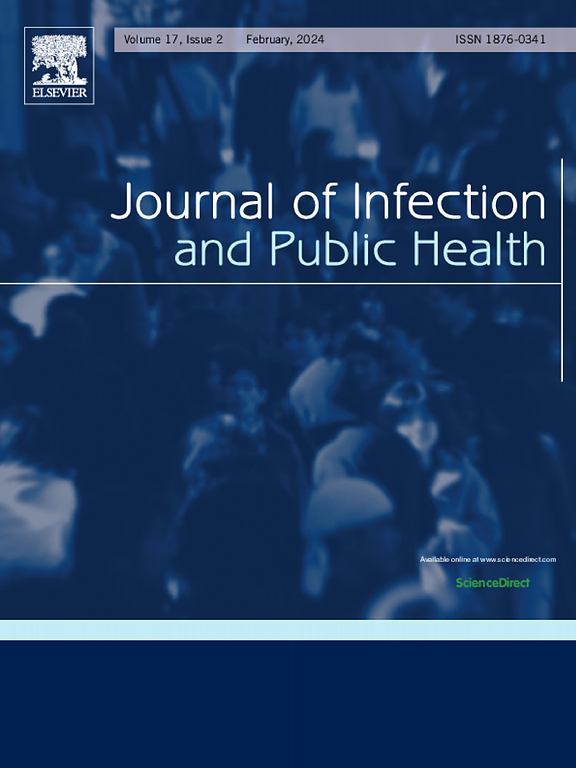Hajj vaccination strategies: Preparedness for risk mitigation
IF 4.7
3区 医学
Q1 INFECTIOUS DISEASES
引用次数: 0
Abstract
Millions of pilgrims travel annually to Makkah and Madinah, Saudi Arabia, for the Hajj, posing unique challenges for public health management and disease control. The large influx of pilgrims from diverse backgrounds traveling to a confined geographic area, coupled with the close proximity and interactions among them, create significant pressure on the healthcare system and heighten the potential for the spread of communicable diseases. This review examines current trends in communicable diseases and their impact, drawing insights from expert perspectives on the required (i.e., meningococcal meningitis, polio, and yellow fever) and recommended vaccinations (influenza, COVID-19) for Hajj participants. The updated COVID-19 vaccine is mandatory for local pilgrims and is strongly recommended for international visitors, with ongoing discussions on adapting protocols to address emerging variants. The timing and strain coverage of influenza vaccination, along with quadrivalent meningococcal vaccination, are also emphasized as critical preventive measures. Diseases such as cholera and yellow fever are addressed underscoring the need for rigorous surveillance and targeted vaccination strategies to mitigate the risk of transmission during the Hajj. By providing up-to-date information on mandated and recommended vaccinations, this review aims to empower pilgrims and healthcare professionals to make informed decisions regarding public health and disease prevention during this significant event.
朝觐疫苗接种战略:为降低风险做好准备
每年都有数百万朝圣者前往沙特阿拉伯麦加和麦地那朝觐,这给公共卫生管理和疾病控制带来了独特的挑战。大量来自不同背景的朝圣者涌入一个狭小的地理区域,加上他们之间的近距离接触和互动,给医疗保健系统带来了巨大压力,并增加了传染病传播的可能性。本综述探讨了当前传染病的趋势及其影响,从专家的角度对朝觐者必须接种的疫苗(即脑膜炎球菌性脑膜炎、脊髓灰质炎和黄热病)和建议接种的疫苗(流感、COVID-19)提出了见解。当地朝圣者必须接种最新的 COVID-19 疫苗,并强烈建议国际游客接种该疫苗,目前正在讨论如何调整接种方案以应对新出现的变种。流感疫苗接种的时间和菌株覆盖率以及四价脑膜炎球菌疫苗接种也作为重要的预防措施得到了强调。会议还讨论了霍乱和黄热病等疾病,强调有必要进行严格监测并采取有针对性的疫苗接种策略,以降低朝觐期间的传播风险。通过提供有关规定和建议接种疫苗的最新信息,本综述旨在增强朝觐者和医疗保健专业人员的能力,使他们能够在这一重大活动期间就公共卫生和疾病预防做出明智的决定。
本文章由计算机程序翻译,如有差异,请以英文原文为准。
求助全文
约1分钟内获得全文
求助全文
来源期刊

Journal of Infection and Public Health
PUBLIC, ENVIRONMENTAL & OCCUPATIONAL HEALTH -INFECTIOUS DISEASES
CiteScore
13.10
自引率
1.50%
发文量
203
审稿时长
96 days
期刊介绍:
The Journal of Infection and Public Health, first official journal of the Saudi Arabian Ministry of National Guard Health Affairs, King Saud Bin Abdulaziz University for Health Sciences and the Saudi Association for Public Health, aims to be the foremost scientific, peer-reviewed journal encompassing infection prevention and control, microbiology, infectious diseases, public health and the application of healthcare epidemiology to the evaluation of health outcomes. The point of view of the journal is that infection and public health are closely intertwined and that advances in one area will have positive consequences on the other.
The journal will be useful to all health professionals who are partners in the management of patients with communicable diseases, keeping them up to date. The journal is proud to have an international and diverse editorial board that will assist and facilitate the publication of articles that reflect a global view on infection control and public health, as well as emphasizing our focus on supporting the needs of public health practitioners.
It is our aim to improve healthcare by reducing risk of infection and related adverse outcomes by critical review, selection, and dissemination of new and relevant information in the field of infection control, public health and infectious diseases in all healthcare settings and the community.
 求助内容:
求助内容: 应助结果提醒方式:
应助结果提醒方式:


